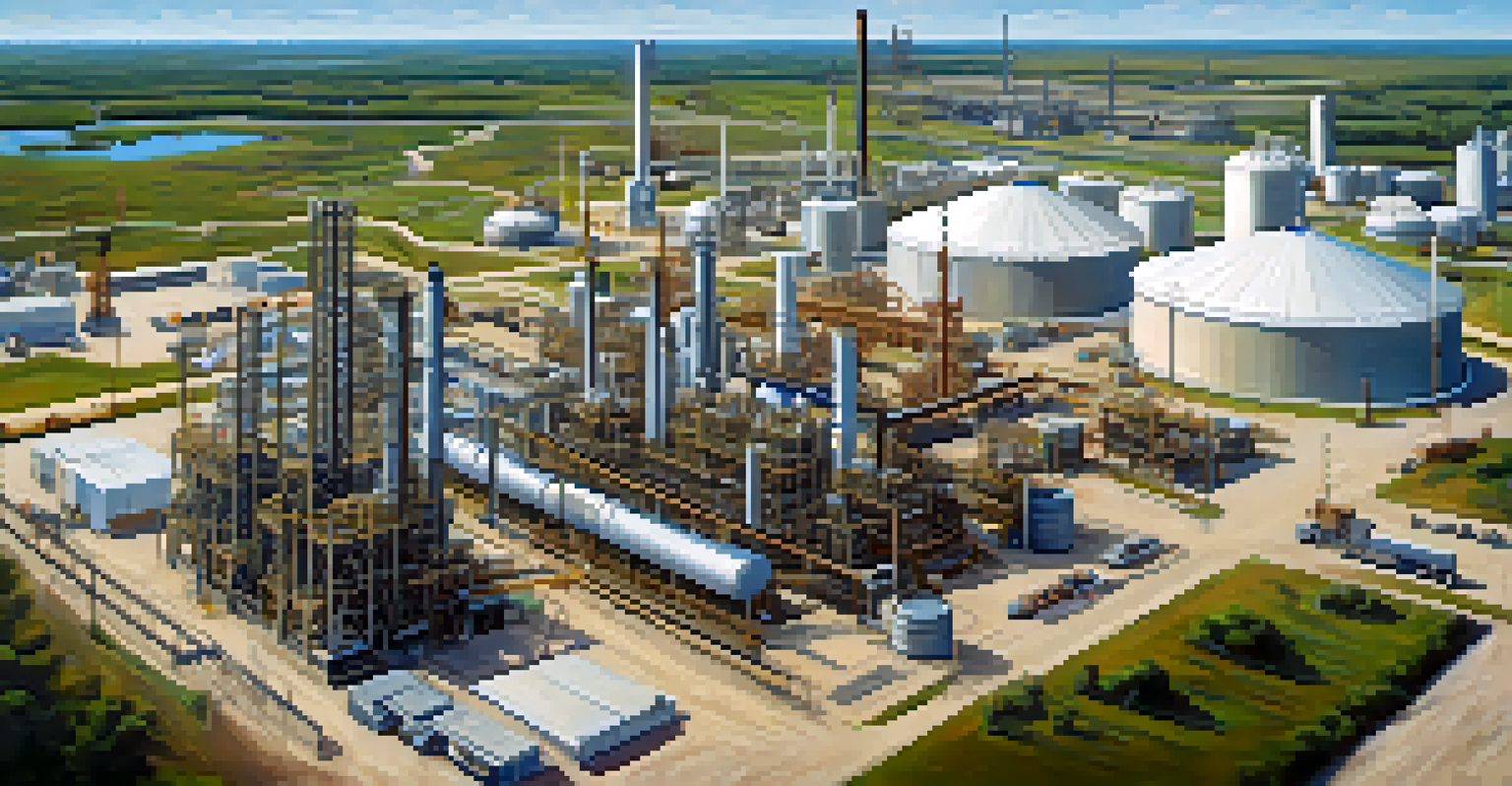Texas Oil and Gas Industry: Backbone of the Economy

Overview of Texas Oil and Gas Industry's Impact
The Texas oil and gas industry plays a crucial role in the state's economy, contributing significantly to job creation and revenue generation. In fact, Texas is the largest oil producer in the United States, which underlines its importance on both state and national levels. This industry not only fuels the economy but also supports various sectors ranging from manufacturing to transportation.
The oil and gas industry is crucial not just for Texas, but for the entire nation, as it drives innovation and creates jobs while fueling the economy.
With thousands of companies operating in the oil and gas sector, Texas has become a hub for innovation and technological advancement. Companies are constantly developing new methods to extract resources more efficiently, which boosts productivity and reduces environmental impact. This focus on innovation ensures that Texas remains competitive in a constantly evolving energy landscape.
Moreover, the oil and gas sector significantly contributes to state and local tax revenues, funding essential public services such as education, infrastructure, and healthcare. This financial support emphasizes the industry's role as a backbone of the Texas economy, providing stability and growth opportunities for residents.
Job Creation and Economic Growth
The oil and gas industry is a powerful engine for job creation in Texas, directly employing hundreds of thousands of workers. From engineers and geologists to truck drivers and administrative staff, the variety of roles creates a diverse job market. Additionally, many support industries, such as construction and hospitality, benefit from the economic activity generated by oil and gas operations.

In 2022 alone, the Texas oil and gas sector was responsible for over 400,000 direct jobs, showcasing its importance in providing stable employment opportunities. These positions often come with competitive salaries and benefits, enhancing the quality of life for many Texas families. As the industry continues to grow, it is expected that job opportunities will increase, further driving economic stability.
Texas Oil and Gas Fuels Economy
The Texas oil and gas industry significantly drives the state's economy through job creation and tax revenues.
Furthermore, the economic ripple effect of oil and gas extends beyond immediate job creation. When workers spend their salaries on homes, groceries, and services, it stimulates local economies, creating even more jobs in different sectors. This interconnectedness highlights how vital the oil and gas industry is to Texas's overall economic health.
Technological Innovations in the Industry
Texas is at the forefront of technological advancements in the oil and gas sector, leading the way in practices like hydraulic fracturing and horizontal drilling. These innovations have revolutionized the way oil and gas are extracted, making previously unreachable resources accessible. As a result, Texas has seen a remarkable increase in production, solidifying its status as a global energy leader.
Sustainability is not just a trend; it's a responsibility that the oil and gas industry must embrace to thrive in the future.
Moreover, the push for cleaner and more efficient extraction methods has spurred significant investment in research and development. Companies are exploring alternative energy sources and implementing sustainable practices, which not only benefit the environment but also attract eco-conscious investors. This blend of traditional and innovative practices illustrates Texas's adaptability in a changing energy market.
The impact of these technological innovations reaches far beyond the industry itself. They create new jobs in tech and engineering fields, providing opportunities for individuals to engage in cutting-edge work. As the Texas oil and gas sector continues to evolve, it sets a precedent for other states and countries to follow.
Environmental Challenges and Solutions
While the Texas oil and gas industry contributes significantly to the economy, it also faces environmental challenges that are becoming increasingly important to address. Issues such as air and water pollution, habitat disruption, and greenhouse gas emissions have raised concerns among communities and environmentalists alike. This has prompted the industry to reevaluate its practices and seek more sustainable solutions.
In response to these challenges, many companies are investing in environmental protection initiatives, such as reducing emissions and improving energy efficiency. For instance, the adoption of advanced monitoring technologies has helped track pollution more effectively, allowing for timely intervention. These efforts not only mitigate environmental impacts but also enhance the industry's reputation.
Innovation Shapes Future Practices
Technological advancements in extraction methods are making Texas a leader in energy production while reducing environmental impact.
Moreover, collaboration between the oil and gas sector and environmental organizations is fostering innovative solutions to balance economic growth and environmental stewardship. By prioritizing sustainability, the Texas oil and gas industry aims to demonstrate that it can be both economically viable and responsible, paving the way for a more sustainable future.
The Role of Texas in National Energy Policy
Texas's prominence in oil and gas production positions it as a key player in national energy policy discussions. As the largest oil-producing state, Texas influences energy prices and availability across the country. This significant role gives Texas a unique platform to shape policies that affect not just the state but the entire nation.
Additionally, Texas's energy landscape is often viewed as a testing ground for new regulations and policies. The state's robust infrastructure and diverse energy sources provide valuable insights into the impacts of various energy initiatives. Policymakers frequently look to Texas as a model for balancing economic growth with environmental responsibilities.
The collaboration between Texas energy companies and government agencies is crucial for developing effective strategies that promote energy independence and security. By working together, they can address challenges such as energy transition and grid reliability, ensuring that the U.S. remains a leader in global energy markets.
Community Impact and Corporate Responsibility
The Texas oil and gas industry is more than just an economic powerhouse; it also plays a vital role in supporting local communities. Many companies engage in corporate social responsibility initiatives, funding local schools, healthcare facilities, and infrastructure projects. This commitment to community well-being fosters goodwill and strengthens relationships between the industry and residents.
Moreover, the industry often partners with local organizations to address pressing social issues, such as education and workforce development. By investing in training programs and scholarships, oil and gas companies help prepare the next generation for careers in the sector. These efforts not only benefit the community but also ensure a skilled workforce for the future.
Community Engagement is Key
Oil and gas companies in Texas actively invest in local communities through corporate social responsibility initiatives and workforce development.
Furthermore, the industry's engagement in community development reinforces its commitment to being a responsible corporate citizen. By prioritizing community needs, Texas oil and gas companies can create a positive impact that transcends economic contributions, fostering a culture of collaboration and support.
Future Outlook of the Texas Oil and Gas Industry
As we look to the future, the Texas oil and gas industry faces both exciting opportunities and significant challenges. The global shift towards renewable energy sources is prompting the industry to adapt and innovate continuously. Companies are increasingly investing in cleaner technologies and diversifying their energy portfolios to remain competitive in an evolving market.
Additionally, the ongoing demand for energy, both domestically and internationally, provides a strong foundation for Texas's oil and gas sector. As the population grows and economies develop, the need for reliable energy sources will continue to rise. Texas is well-positioned to meet this demand, ensuring its status as a leading energy provider.

Ultimately, the future of the Texas oil and gas industry will depend on its ability to balance economic growth with environmental and social responsibilities. By embracing innovation, sustainability, and community engagement, Texas can continue to be a model for the energy sector, paving the way for a prosperous and responsible energy future.